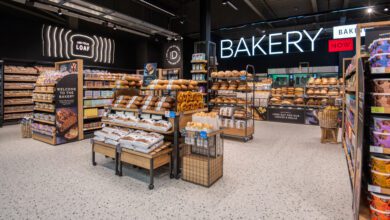Brexit. The term alone conjures layers of complexity for UK retailers as they try to adjust to the changing tides of regulations, consumer behaviours, and economic challenges. Retail is a dynamic industry, historically resilient but now forced to adapt faster than ever. In an engaging conversation, Alexander Otto and Richard Lim share research by Retail Economics and Tradebyte that shows non-food EU exports bearing the brunt of disruption. Their insights highlight the complexities of the post-Brexit landscape for UK-based brands and retailers, and the opportunities that online marketplaces bring to exports.
A Journey into Retail
Alexander Otto’s career path has been anything but conventional. “I started as a nurse,” he recalls with a chuckle. “Then I was a drummer in a couple of bands… I was also a restaurant critic, then a consultant for an agency.” His path eventually leads him to Tradebyte, a retail software company, where he now serves as Head of Corporate Relations. Otto’s diverse background, rich with public-facing roles, positions him well for Tradebyte’s current focus: offering brands a gateway into European markets, especially in light of Brexit’s barriers.
For Richard Lim, an early entrepreneurial spirit sets him on a path towards economics. “My first business was when I was actually around ten years old,” he reminisces, thinking back to selling pewter dog models at dog shows. Lim goes on to study economics, eventually founding Retail Economics. As CEO, he combines a love of data with a deep understanding of retail, giving brands insights into consumer trends and market disruptions.
Brexit’s Bite into UK Retail Exports
Since the UK’s departure from the EU, many retail brands have found that exporting to Europe now involves a high degree of “red tape,” as Lim puts it. “There’s the extra friction… whether that’s around customs procedures, VAT changes, tariffs, or rising operational costs.” The impact, he says, has been substantial. “Exports decreased from around £33.6bn before Brexit in 2019 to £27.6bn in 2023,” Lim highlights, revealing a nearly 18% drop that has been “significant and uneven across the industry.”
This complexity isn’t a fleeting issue, Lim continues, with smaller UK businesses particularly affected, as they often find themselves unable to absorb the added costs and compliance requirements. Lim gives the example of one unnamed UK brand, which, for instance, chose to forgo the EU altogether, focusing instead on expanding in the US—a move that reflects a widespread sentiment among smaller brands. “It just wasn’t worth the hassle,” Lim concludes.
Otto notes additional concerns about Brexit’s impact beyond trade. “There’s still that global European uncertainty after the Ukraine war and supply chain costs… it’s just not as predictable as it was in the heydays of e-commerce,” he observes. However, he points out that demand in key markets, particularly Germany, remains robust. “Germany is in the lead, the largest online market in the EU, with nearly 90bn euros per year,” he notes, pointing to the ongoing potential for UK brands to tap into that market—if they can navigate the new regulatory landscape.
Shifting Strategies and Marketplace Potential
The conversation naturally turns to digital marketplaces, which are playing an increasingly vital role for brands looking to expand. “Marketplaces are in the top three disruptive forces,” Lim emphasises. These platforms, he says, offer both an “effective route to market and an effective tool to internationalise.”
Otto explains how Tradebyte itself has transitioned to support this need. “We’re in a very objective position when it comes to retail because we’re doing onboarding for brands who want to sell on marketplaces,” he says. The company’s role as a connector between retailers and marketplaces enables UK brands to reach European consumers more efficiently, allowing them to focus on quality and strategy in a rapidly evolving environment.
Apparel and Footwear—The Brexit Fallout
Among the sectors most affected by Brexit’s complexities, apparel and footwear stand out. The report Lim co-authored with Tradebyte finds that UK exports in these categories plummeted—footwear exports, for example, dropped from £7.4bn in 2019 to £2.7bn. “It’s almost astonishing,” Lim remarks about the 64% decline. The challenges for UK apparel brands, he explains, stem not only from Brexit-related barriers but also from increased competition. “There’s lots of European apparel brands that can now sell into their own market much more effectively than UK brands entering,” Lim explains.
Otto expands on the difficulties specific to apparel, especially in the face of unpredictable global supply chains. “Shipping costs have gone up significantly,” he notes. Seasonal changes in stock, popular in the fashion industry, also complicate matters. “You might buy a T-shirt or a shirt four times a year,” Otto says, in contrast to less frequent purchases of higher-ticket items like electronics or gardening machinery.
A Crisis-Induced Consumer Mindset Shift
The report highlights that while apparel took a hit, other sectors such as health, beauty, and DIY gardening saw slight growth during the same period. Lim attributes some of this to what he calls the “lipstick effect.” During economic downturns, he explains, consumers often opt for small, feel-good purchases over big-ticket items. “People trade down from higher-value goods to lower-value ones to make themselves feel good,” he says.
This shift, Otto suggests, extends into lifestyle choices as well. “In times of crisis… people tend to focus more on things for themselves,” he says, referring to the increase in gardening and health-related purchases. This sentiment, Otto believes, reflects consumers’ desire for a sense of well-being amidst economic instability. He points to the growth of health and beauty brands on platforms like TikTok, which he describes as “a tremendous success” in expanding brand reach and resilience during tough times.
Outlook on the Future of UK-EU Retail Exports
When asked about the future, both Otto and Lim voice a cautious optimism. Lim acknowledges that the transition post-Brexit has been “painful” but expresses hope that the situation will stabilise in the coming years. “We’re likely to see more stabilisation… we might see new free trade agreements come online,” he says. Lim also notes the role of technological advancement in e-commerce, which could help UK brands streamline exports.
Otto agrees, pointing to what he sees as growing maturity in digital retail strategies. “There is a level of maturity now,” he says, referring to brands’ increased ability to utilise digital ecosystems for cost-effective and efficient solutions. The evolving digital landscape, Otto believes, may encourage UK brands to continue “going international, going beyond borders,” and exploring untapped markets across Europe. However, he admits that such an optimistic outlook requires strong partnerships, a theme Lim echoes.
“Partnerships are probably the cornerstone,” Lim emphasises. By forming strategic alliances across logistics, digital platforms, and other parts of the supply chain, retailers can navigate some of the added complexities of international trade.
The Road Ahead for Retailers
The conversation concludes with an acknowledgment of the retail industry’s need for agility. For UK brands, navigating Brexit’s hurdles involves careful consideration of market strategy and logistics. Lim points out that companies need to “optimise supply chains, logistics, and drive better efficiency.” Otto concurs, urging brands to adopt a “culture of innovation and nimbleness” to remain competitive.
Both Otto and Lim agree that the future of UK retail exports to the EU holds promise, albeit with challenges. But for retailers prepared to adapt, a changing landscape might offer new opportunities, rather than obstacles.











